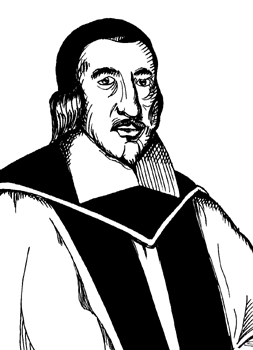 |
 |
|||
|
Thomas
Turner was born in Reading in
Berkshire in 1591, the son of Thomas Turner of Heckfield in Hampshire,
sometime Mayor of Reading, and his
wife, Mary the daughter of Walter Bye of Reading. He was educated at Reading
Grammar School from where he obtained a Reading scholarship to St. John’s
College, Oxford. He matriculated on 26th June 1610, graduating as a bachelor
of arts on 6th June 1614 and a Master on 9th May 1618. He was elected a
fellow, took the degree of bachelor of divinity on 20th July 1624, and was
created a doctor of divinity on 1st April 1633. Turner
was a lecturer in dialectic and Greek at St. John’s, as well as keeper of
their library. In 1623, they presented him to the vicarage of St. Giles’,
Oxford, which he held with his fellowship, but relinquished in 1629. William
Laud, who had been the college president, made him his chaplain and
licenser when he became Bishop of London. He had much regard for him and,
upon his death, bequeathed him his “ring with a diamond, and the garter
about it”. On 7th January 1628, Turner was appointed a member of the
Commission for Ecclesiastical Causes and, on 14th April 1629, Laud collated
him to the prebend of Newington in St. Paul’s Cathedral. On 29th October
following, he was collated Chancellor of London and, soon afterwards, his
intimacy with Royalty began when he was appointed Chaplain in Ordinary to
the King. In
May 1631, Turner obtained the rectory of St. Augustine-in-the Gate, but
exchanged it on, 10th November, for that of Southwark. In 1633, he
accompanied King Charles I in his Scottish coronation progress and, on 17th
December of the same year, his name appears in the Commission for Exercising
Ecclesiastical Jurisdiction in England and Wales. On 11th November 1634, he
was instituted rector of Fetcham in Surrey. On 31st December 1638, he and
John Juxon received, from the King, the lease of the prebend and rectory of
Aylesbury for five years. In 1641, he was ejected from St. Olave’s,
Southwark (now the Cathedral), after his congregation complained that he
railed in the communion table there, almost causing a riot. Despite this,
the King still nominated him, on 16th February 1642, to the Deanery of
Rochester but, on 3rd January 1644, was constituted Dean of Canterbury
instead. It was a nominal office, as Kent was then in the hands of
Parliament. He adhered to the King with great devotion and attended him at
Hampton Court and during his imprisonment on the Isle of Wight, being
present at the Royal negotiations with Parliament at Newport in September
1648. During the parliamentary ascendency and in the time of the
Commonwealth, he was much harassed and deprived of all his benefices. Three
of his houses were plundered, his books seized and he himself arrested at
Fetcham by a party of horse for having sent £120
to the King. He was forcibly dragged away while holding divine service and
carried to the White Lion Prison in Southwark. He later retired to obscurity
in Hertfordshire and then Buckinghamshire. At
the Restoration, Turner regained his Surrey rectories and entered into
possession of the Deanery of Canterbury. It is said he declined the offer of
a bishopric, “preferring to set out with too little than too much sail”.
Shortly after, he resigned the rectory of Fetcham and, dying on 8th October
1672, was buried in the Dean’s Chapel in Canterbury Cathedral, where a
mural monument was erected to his memory. He married Margaret, daughter of Sir
Francis Windebank, Principal Secretary of State to Charles I. By her
he had three sons, Francis Turner, the
non-juring Bishop of Ely; Thomas Turner, President of Corpus Christi
College, Oxford; and William Turner, Archdeacon of Durham. Edited from Sidney Lee's 'Dictionary of National Biography' (1899).
|
|||
| © Nash Ford Publishing 2009. All Rights Reserved. | ||||





 Thomas Turner (1591-1672)
Thomas Turner (1591-1672)